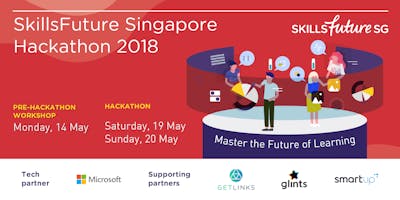Pre-Hackathon Workshop: SkillsFuture Singapore Hackathon 2018
At the Pre-Hackathon Workshop for the SkillsFuture Singapore Hackathon 2018, we'll discuss the Future of Learning. How can we innovate to create solutions that will help Singaporeans adopt a mindset of lifelong learning, and keep up with the effects of disruptive technologies? Experts will share their points of view on the current trends and developments in the field of learning. This is your opportunity to join the discussion, learn about the space, and find out what to expect at the hackathon.
Also, this will be your chance to meet like-minded innovators and form teams for the hackathon!
Challenges
New and emerging technologies are set to disrupt the way we work. Hence, we need to continually evolve the way we learn and acquire skills. We want to encourage peer-to-peer learning, enable organisations to adapt and integrate learning, and invent new ways of tracking and benchmarking.
1. Learning as a Community: Shifting away from a traditional classroom model of learning, peer-to-peer and decentralised learning platforms present opportunities for the access to learning through mediums that people use every day.
The knowledge exchange creates value by leveraging shared expertise and resources contributed by the community as well as the learner himself or herself. Early adopters can lead with their “pro-sumer” (professional consumer) contributions.
The threshold of learning is also reduced – these platforms are easy to join and use through better design (for example, gamification, user interface, etc.).
How might we inspire and empower individuals to learn from and with their peers?
2. Adaptive Organisations: As the demands of the workforce evolve to a culture of growth and engagement with meaningful tasks, organisations are challenged to provide customised – even personalised – training opportunities for their employees.
This will require aligning workplace demands with the aspirations, passions, needs, and preferred ways of learning of individuals.
Individuals have access to platforms and tools that provide the necessary knowledge “just in time” to perform a specific task or assignment and are flexible enough to overcome the perennial employee complaint – lack of time.
How might we enable organisations to adapt and integrate learning, such that the way we work becomes the way we learn?
3. Track & Benchmark: As we establish new pathways of success, we must also build the appropriate infrastructure to support the ecosystem of individual employees and their organisations, entrepreneurs, and government. For example, with informal learning, a new system to track and reward both contributors and learners will need to be designed.
New ways of acknowledging and conferring credentials – supplementing present-day formal accreditation systems – can encourage organisations to hire based on capabilities rather than paper qualifications. It can also promote adaptive accumulation of skills by individuals and help them understand where they are on their path to skills mastery.
Such decentralised forms of learning, tracking, and benchmarking can be made possible by new and emerging technologies such as blockchain and AI. Big Data coupled with a Design Thinking mindset enables organisations to continuously experiment, validate, and innovate.
How might we motivate and support new ways of learning with tracking and benchmarking tools?
Learn more about the challenges here, or join us at the Pre-Hackathon Workshop where we'll discuss them in detail with industry experts.
Also, don't forget to check out the SkillsFuture Singapore Hackathon 2018, where you can collaborate and build the solution that will lay the foundation of the Future of Learning, and stand to win from a prize pool of $12,500!
If you have any questions, drop us an email at hello@upsingapore.com.
